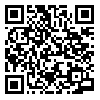BibTeX | RIS | EndNote | Medlars | ProCite | Reference Manager | RefWorks
Send citation to:
URL: http://jrsm.khu.ac.ir/article-1-2355-en.html
Self-talk as “an internal dialogue, through which the individual interprets feelings and perceptions, regulates and changes evaluations and convictions, and gives him/her instructions and reinforcement”. The purpose of the present study was to compare the effect of two types of instructional and motivational self-talk on the pattern of coordination and accuracy of basketball free throw to specify the effect of each types of the self-talks on of basketball free throw skill necessities (patterns of coordination and accuracy). Using available sampling method, 20 male basketball players with the mean age of 23.5±5.5 were selected who had at least 5 years of practice in basketball and were playing in one of the credible leagues of the country. In this study the basketball free throw skill was evaluated through two sessions with the time interval of 24 hours in two phases with and without self-talk (instructional and motivational). The data of the motion pattern and the accuracy of basketball free
throw were recorded in both phases of the test, and the kinematic data was used to compute the throw hand elbow-wrist No-RMS in order to investigate the coordination pattern. In statistical analysis, the data was analyzed using descriptive statistics
(mean, standard deviation, tables and figures) and inferential statistics (the analysis of variance with repeated measure and dependent t test). The results of throw accuracy showed that solely the use of instructional self-talk leaded to a significant
enhancement of the basketball free throw accuracy (t(9): 4.388, p: 0/002). Moreover, there was a significant difference between the effect of instructional self-talk and motivational self-talk in favor of instructional self-talk (2: 0.444, F(1,18): 14.364, p:0.001). Exploring the results of coordination pattern revealed that instructional selftalk leads to a significant (t(9): .048, p(1,18): 2.288) decline in elbow-wrist No-RMS and consequently an improvement in elbow-wrist interalimb coordination in performing the basketball free throws. The results indicated that the usage of instructional selftalk are benefical in improving the skills that require motiom coordination and accuracy of performance and it is superior to the use af motivational self-talk in this regard.
Received: 2016/09/7 | Accepted: 2016/09/7 | Published: 2016/09/7
| Rights and permissions | |
 | This work is licensed under a Creative Commons Attribution-NonCommercial 4.0 International License. |





